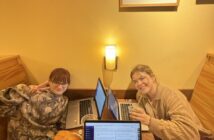By Cheyenne Johnson, staff writer
Some students may believe that their personal lives have nothing to do with science. This is wrong, however, according to Dr. Leo Ondrovic: science deals with every aspect of a person’s being, not just inside their body.
On Friday, Oct. 12, Ondrovic spoke on the importance of living life well and how it relates to thermodynamics.
“It’s about personal wellness with a little bit of science sprinkled in,” he said.
He started off his talk with a diagram: Opinion<Theory<Fact. He told of how nothing is greater than facts.
Ondrovic defined the First Law of Thermodynamics as the idea that “In isolated systems, energy is conserved.” Energy cannot be created or destroyed, only changed. Ondrovic talked about how human bodies are not isolated systems, that every human gain and loses energy. The only thing that is a truly isolated system is the universe. There is no energy that can be received from outside of the universe, and no energy can escape outside of the universe.
As is stated, energy cannot be created or destroyed. This means that the energy has to equal what goes in and what comes out with the exception of what is stored in a system. Using people as an example: energy goes in, some of it is stored, and then some of it comes out. Though there is less energy coming out than there was going in, energy was not lost; it was simply changed into a different form inside the human body.
Ondrovic went on to talk about the Second Law of Thermodynamics: the change in entropy is greater or equal to zero in an isolated system. Entropy is a thermodynamic quantity representing the unavailability of a system’s thermal energy for conversion into mechanical work.
“Entropy is randomness, there is no specific pattern,” said Ondrovic.
“[The Second Law of Thermodynamics is the reason things] wear out, decay, erode, break down, fall apart, disintegrate, or die,” he said. “The repercussion to this is aging.”
Ondrovic elaborated on the idea of human health. He talked about how nutritional excellence is available to everyone in the United States, yet this country is suffering from a huge obesity epidemic.
Health can be measured by the amount of nutrition over the number of calories. Meat and dairy do not have much nutrition, yet have a lot of calories. This is not necessarily good for the human body.
Ondrovic mentioned how a student of his told him that he would run a mile every time he felt sick.
Ondrovic did not see how this was credible until he read a book written by Chris Crowley and Henry S. Lodge. It talked about how, in order to stay healthy, people should exercise six times a week. More specifically, aerobic exercises four days a week and weight training two times a week.
Swimming and biking are known as “healing exercises,” Ondrovic said.
He also told of how before he read this book, he did not realize that an increase in muscle strength helped protect people’s joints from damage.
Ondrovic concludes his speech with his personal epiphany:
“The Second Law of Thermodynamics applies to every aspect of my life: mental and physical health, spirituality, economics, maintenance of the home, relationships, professionally, and academically.
“It takes a healthy brain to maintain a full life, and a healthy body to maintain a healthy brain.”





